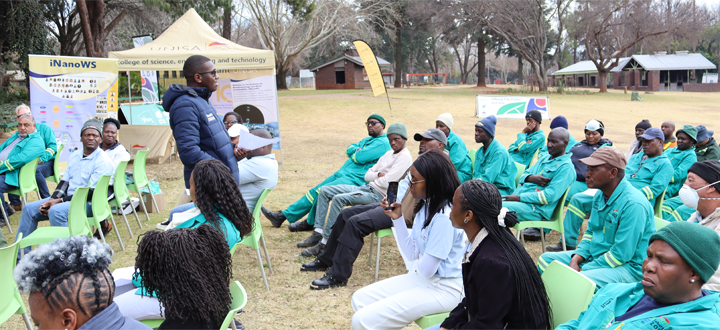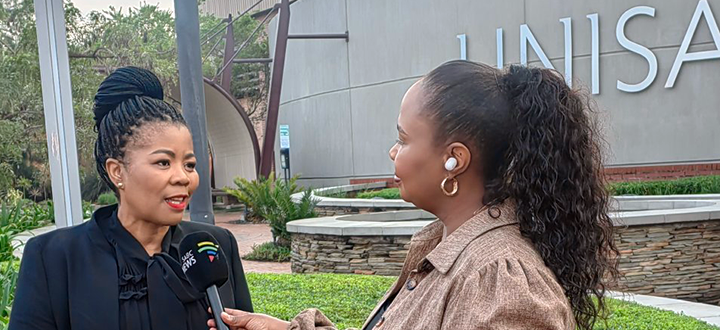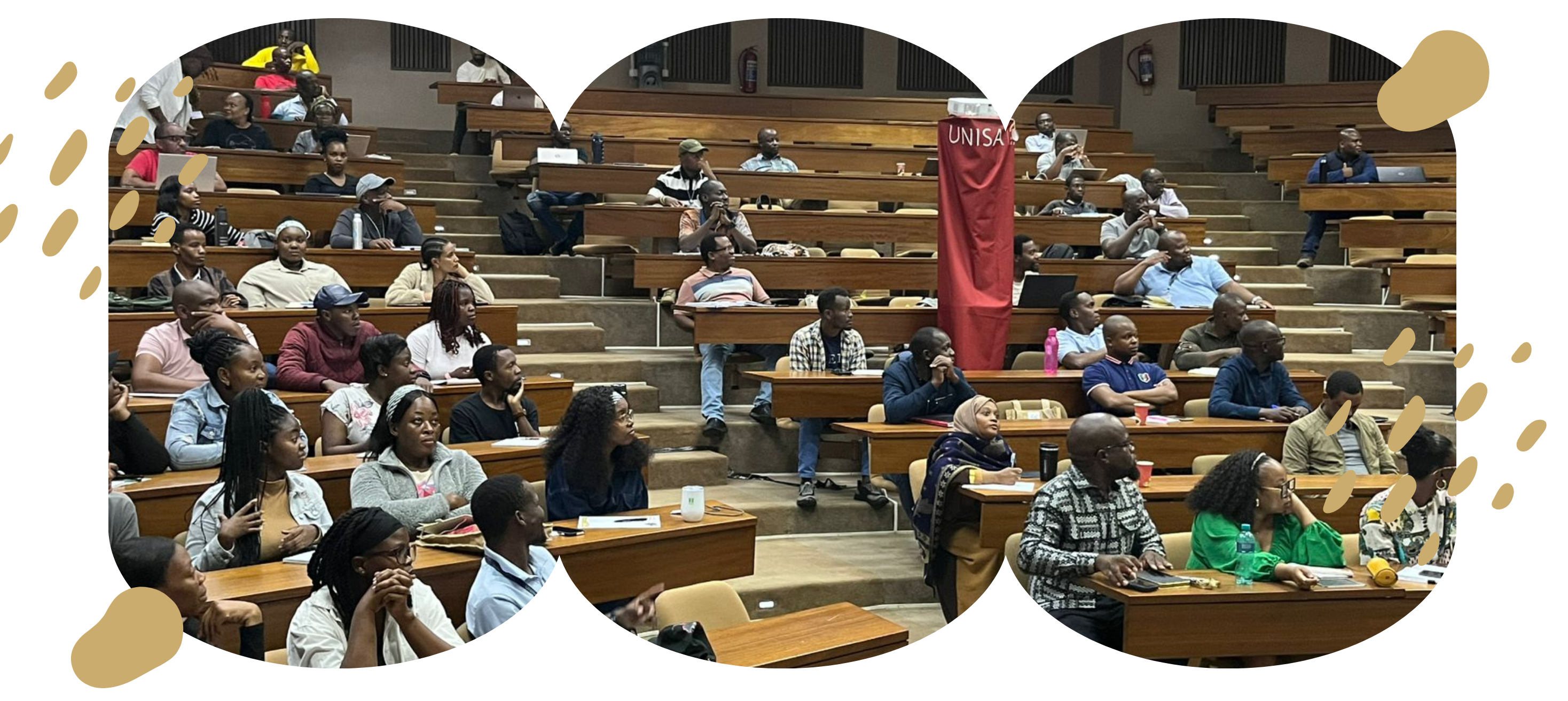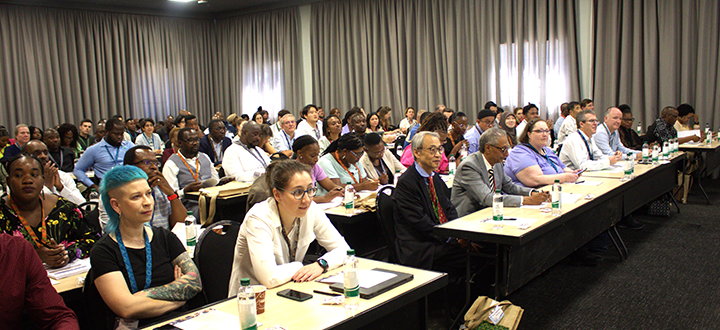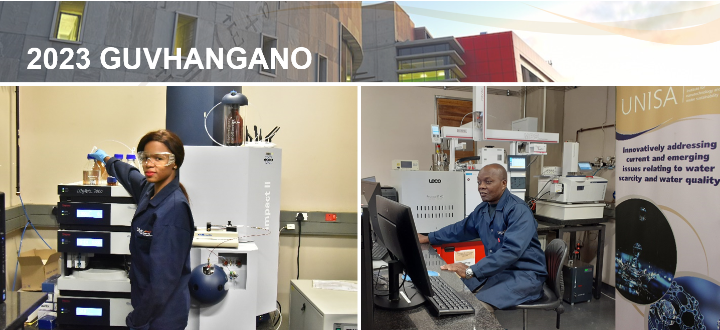Institute for Nanotechnology and Water Sustainability
iNanoWS and JCPZ: Honouring Nelson Mandela’s Legacy at Florida Lake
On 18 July 2025, in celebration of Nelson Mandela Day and his 67 years of public service, the Institute for Nanotechnology and Water Sustainability (iNanoWS) partnered with Johannesburg City Parks & Zoo (JCPZ) for an impactful environmental initiative at Florida Lake Regional Park. Read more.
iNanoWS and JCPZ: Honouring Nelson Mandela’s Legacy at Florida Lake
On 18 July 2025, in celebration of Nelson Mandela Day and his 67 years of public service, the Institute for Nanotechnology and Water Sustainability (iNanoWS) partnered with Johannesburg City Parks & Zoo (JCPZ) for an impactful environmental initiative at Florida Lake Regional Park. Read more.
SABC shines spotlight on Unisa's Science Campus and the university’s catalytic niche areas
The Morning Live team recently visited the Unisa Science Campus to learn about the university’s wide range of offerings, its exciting catalytic niche areas, and its potential role in providing alternative learning options while addressing the current student uptake crisis. Read more.
SABC shines spotlight on Unisa's Science Campus and the university’s catalytic niche areas
The Morning Live team recently visited the Unisa Science Campus to learn about the university’s wide range of offerings, its exciting catalytic niche areas, and its potential role in providing alternative learning options while addressing the current student uptake crisis. Read more.
Successful completion of the 2025 iNanoWS Induction and Orientation
The Institute for Nanotechnology and Water Sustainability recently held a two-day programme to welcome new iNanoWS staff, MSc, PhD, and PDFs, from February 12 to 13, at the Thamsanqa Kambule Auditorium on UNISA's Science Campus. The theme of the event was “Towards improved lab-user safety, independence, and shared responsibility.” Read more.
Successful completion of the 2025 iNanoWS Induction and Orientation
The Institute for Nanotechnology and Water Sustainability recently held a two-day programme to welcome new iNanoWS staff, MSc, PhD, and PDFs, from February 12 to 13, at the Thamsanqa Kambule Auditorium on UNISA's Science Campus. The theme of the event was “Towards improved lab-user safety, independence, and shared responsibility.” Read more.
Young Unisa researcher listed amongst the Mail & Guardian’s 200 Young South Africans 2024
Unisa celebrates Dr Tshimangadzo Munonde from the university’s Institute for Nanotechnology and Water Sustainability in the College of Science, Engineering and Technology who has been named as one of South Africa’s brightest young minds and trailblazers under the age of 35. Read more.
Young Unisa researcher listed amongst the Mail & Guardian’s 200 Young South Africans 2024
Unisa celebrates Dr Tshimangadzo Munonde from the university’s Institute for Nanotechnology and Water Sustainability in the College of Science, Engineering and Technology who has been named as one of South Africa’s brightest young minds and trailblazers under the age of 35. Read more.
A first for Africa as Unisa hosts two IWA conferences
From 3 to 8 December 2023, Unisa's College of Science, Engineering and Technology, in partnership with the Institute for Nanotechnology and Water Sustainability, hosted two International Water Association specialist conferences back-to-back in celebration of Unisa's 150-year anniversary. Read more.
A first for Africa as Unisa hosts two IWA conferences
From 3 to 8 December 2023, Unisa's College of Science, Engineering and Technology, in partnership with the Institute for Nanotechnology and Water Sustainability, hosted two International Water Association specialist conferences back-to-back in celebration of Unisa's 150-year anniversary. Read more.
Key Stakeholders on the Future of Water at UNISA Conference
On the 16th of November 2023, Unisa’s Institute for Nanotechnology and Water Sustainability will host an annual industry-academia-government conference, 2023 iNanoWS Guvhangano, under the theme “Sculpting new research frontiers”. Read more.
Key Stakeholders on the Future of Water at UNISA Conference
On the 16th of November 2023, Unisa’s Institute for Nanotechnology and Water Sustainability will host an annual industry-academia-government conference, 2023 iNanoWS Guvhangano, under the theme “Sculpting new research frontiers”. Read more.

The Institute for Nanotechnology and Water Sustainability (iNanoWS) is a strategic research niche at the College of Science, Engineering and Technology (CSET) that addresses current and emerging issues relating to water quality and water scarcity. Central to this, is the use of conventional and innovative technologies that will help provide alternative water resources and to ensure that such water is treated to acceptable levels suitable for its purpose, for example, drinking or any non-potable use, such as industrial, agricultural or groundwater discharge. The iNanoWS draws expertise from a number of researchers, collectively with lots of experience and their international collaborators have answered a number of research questions pertaining to water quality and supply issues.
The institute is also at the forefront of integrating nanotechnologies with existing water treatment practices with the goal of optimizing the efficiency of conventional water treatment technologies.
The iNanoWS focuses on the development of nanotechnology enhanced membrane materials (and adsorbents) and Water Sustainability. In this context, water sustainability refers to:
- Potable water production from both traditional water sources (fresh surface and ground waters) and non-traditional water sources (contaminated surface and ground waters, brackish groundwater and seawater)
- Advanced wastewater treatment to protect drinking water sources from contamination and to harvest fresh water, biogas, and fertilizer from wastewater.
- Production of clean, renewable (base load) power from salinity gradients.
These focus areas are drawn from accumulated research experience of this research group as evidenced by the numerous research articles that have been published over the last ten years. Beyond the application and science of nanostructured membranes for use in water treatment and water desalination, the research plan includes development of novel nanomaterials as adsorbents, catalysts and sensors for water purification and understanding the fate of these engineered nanoparticles in the environment.
Furthermore, we monitor and characterize natural organic matter (NOM) in water and its treatability throughout the water treatment train especially after water disinfection which results in disinfection by-products which often pose a serious threat to health. In relation to this, we are able to quantify the disinfection by products as well as other emerging pollutants particularly persistent organic pollutants (POPs) which have not yet been studied to any greater detail compared to the inorganic species in water with respect to their removal. Moreover, analytical methods have to be developed in order to quantify the organic and inorganic pollutants found in water since some of these pollutants are present at parts-per-billion levels.
iNanoWS AT A GLANCE
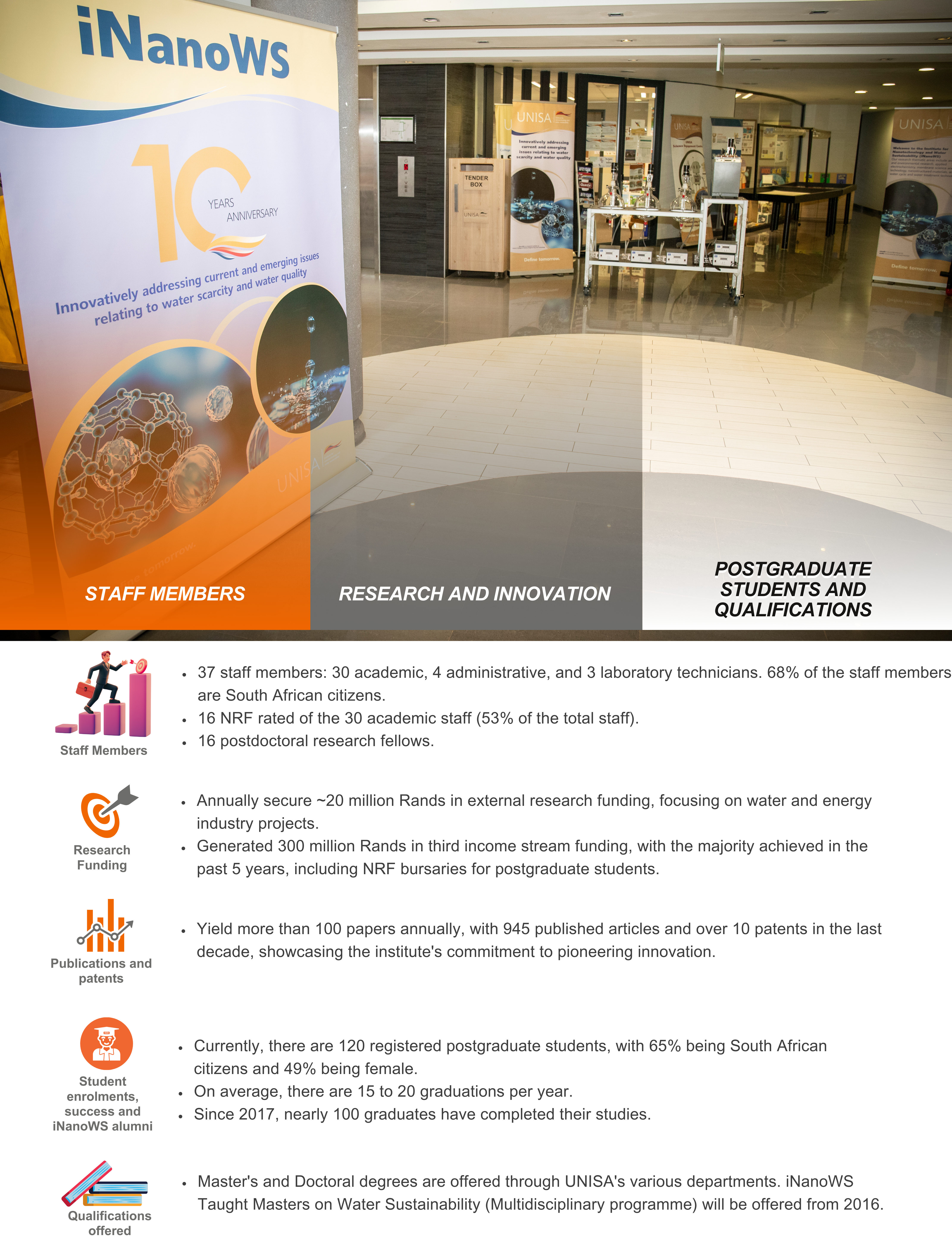
Last modified: 2025/02/13

